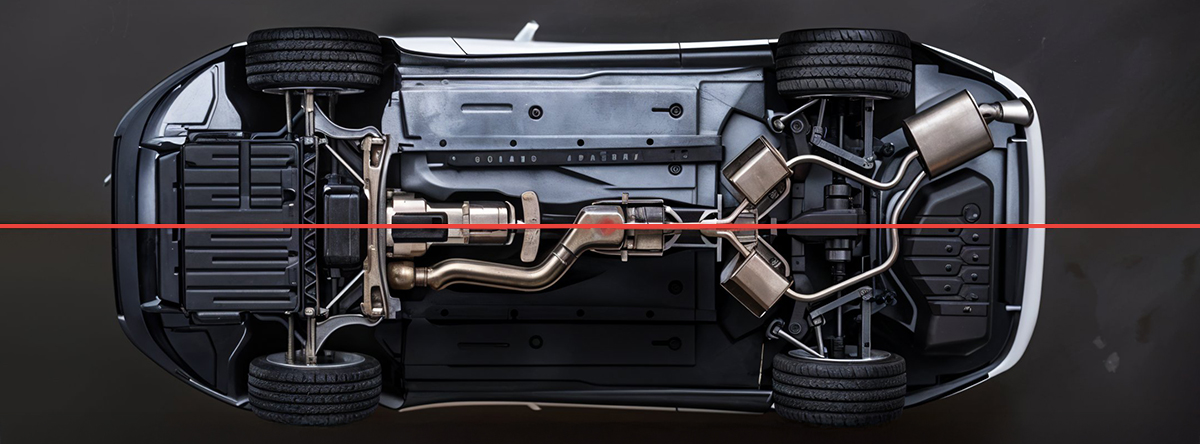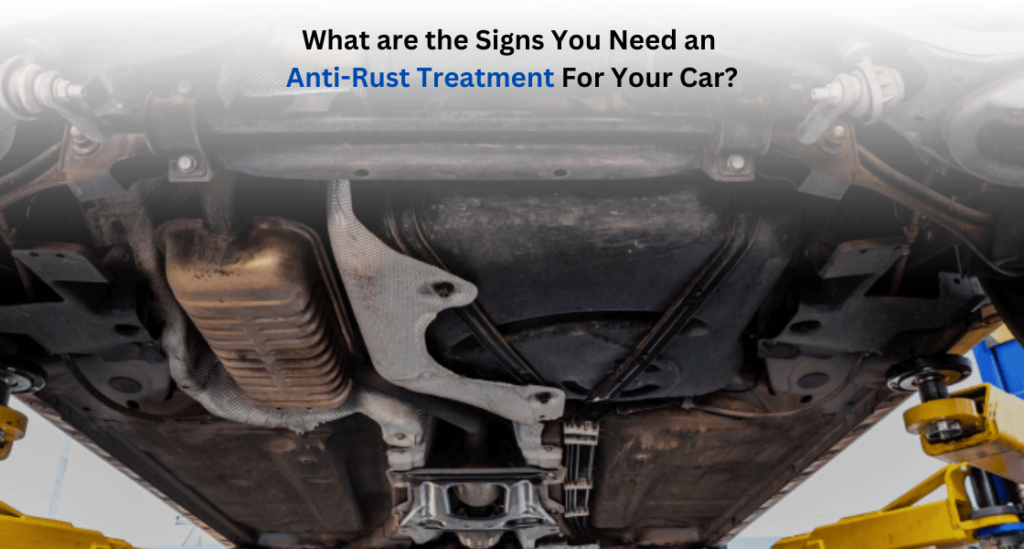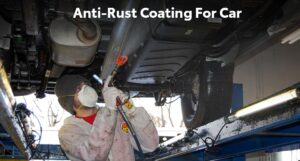An anti-rust treatment represents a crucial investment for your vehicle protection.
Rust is one of the most common and damaging issues that can affect a vehicle, leading to structural weaknesses and costly repairs. Rust can deteriorate your car’s body and vital components, reducing its lifespan and resale value.
Find below the key signs that indicate the requirement for an anti-rust treatment for your vehicle.
Table of Contents
ToggleWhat is an Anti-Rust Treatment For Your Car?

An anti-rust treatment for cars involves applying a protective coating to the vehicle’s undercarriage and body panels to prevent corrosion. This coating acts as a barrier against moisture, salt, and other corrosive elements, extending the vehicle’s lifespan, preserving its structural integrity, and maintaining its appearance by preventing rust formation. Regular treatments ensure long-term protection and reduce maintenance costs.
Top Signs You Need to Book an Anti-Rust Treatment For Your Car
Find below the various signs you should watch out for to prevent damage from rust and corrosion:
1. Visible Rust Spots on the Car’s Surface
The presence of visible rust spots on the car’s body indicates the need for an anti-rust treatment. These can appear as small brown, orange, or reddish spots, typically on the car’s doors, hood, trunk, or wheel arches.
Rust spots often start small but can quickly spread, especially in areas exposed to moisture and road salt. If you notice even minor rust formation, it is crucial to address the issue immediately. An anti-rust treatment can stop the rust from spreading and protect your car’s paintwork and metal surfaces.
2. Paint Bubbling or Peeling
When rust starts developing beneath the paint, it often causes bubbling, cracking, or peeling. This happens because moisture and air get trapped under the paint, causing corrosion that weakens the bond between the paint and metal.
If you see any bubbles or peeling sections on your car’s paint, it’s a warning sign that rust is forming underneath. Applying an anti-rust treatment at this stage can prevent further damage and save you from expensive paint and body repairs.
3. Corrosion on Undercarriage and Chassis
The undercarriage of your car is one of the most vulnerable areas to rust. Since it is constantly exposed to water, dirt, salt, and road debris, rust can develop quickly if there is no proper protection.
Check the underside of your vehicle regularly for any signs of corrosion, including flaky metal, rust-colored patches, or holes. If you live in an area with heavy rainfall, snowfall, or coastal conditions, your undercarriage is at even greater risk. Anti-rust treatment can help protect this crucial part of your car from severe damage.
4. Unusual Noises from Suspension or Frame
Rust doesn’t just affect the car’s appearance; it can also weaken its structure and mechanical components. If you start hearing unusual creaking, squeaking, or groaning sounds from the suspension, frame, or wheel wells, it could be a sign that rust has compromised these parts.
When rust weakens the metal, it can cause components to become loose or unstable. This can make your vehicle unsafe to drive and lead to costly repairs. Applying anti-rust treatment early can help preserve the integrity of your car’s suspension and frame.
5. Presence of Rust in the Engine Bay or Exhaust System
The engine bay and exhaust system are two other areas that can be severely impacted by rust. Since the exhaust system is exposed to high temperatures and moisture, it is highly prone to rust and corrosion. If you notice rust forming on the exhaust pipes or muffler, it can lead to leaks and reduced engine performance.
Similarly, rust in the engine bay can affect the battery terminals, wiring, and metal components, potentially leading to electrical and mechanical failures. If you spot rust in these critical areas, it is essential to get an anti-rust treatment to prevent further deterioration.
6. Water Leaks Inside the Car
If water starts seeping into the car’s interior, it could be due to rust eating away at the body panels, door seals, or floor pan. Moisture inside the cabin can lead to mold, unpleasant odors, and damage to the upholstery and electronics.
Check for wet carpets, damp seats, or condensation on the windows. If you notice water leaks, inspect the affected areas for rust damage and consider an anti-rust treatment to prevent further corrosion.
7. Increased Difficulty in Opening Doors or Windows
Rust can also affect your car’s doors, hinges, and window mechanisms. If you experience difficulty opening or closing doors, or if your power windows become slow or jammed, rust buildup could be the culprit.
Corroded door hinges and window regulators can make daily use frustrating and may lead to complete failure over time. Applying an anti-rust treatment can help maintain these components and ensure they function smoothly.
8. Foul or Musty Smell Inside the Car
A musty or damp smell inside the car is often a sign of hidden rust and water damage. When rust forms on metal parts within the cabin, such as seat frames or the dashboard structure, it can create a breeding ground for mold and mildew.
If you notice an unpleasant smell, inspect your car’s interior for any signs of rust or moisture accumulation. Anti-rust treatment can help prevent further rust-related damage and keep your car’s interior fresh and clean.
9. Rust Spots Around Bolts and Fasteners
Bolts, nuts, and fasteners are essential for holding different parts of your car together. If these components start rusting, they can weaken and cause parts to loosen or detach.
Check for rust around the bolts on the doors, hood, trunk, and undercarriage. If you notice any rust, it’s a sign that corrosion is spreading and needs immediate treatment. Applying an anti-rust coating to these areas can help prevent further damage.
10. Living in High-Risk Areas
If you live in a region with frequent rain, high humidity, coastal air, or snowy winters with salted roads, your car is at a higher risk of rust damage. Salt and moisture accelerate the rusting process, making anti-rust treatment a necessity rather than an option.
Regularly inspecting your car and applying rust protection can help extend its lifespan and maintain its value. If you drive in these conditions, investing in an anti-rust treatment is one of the best ways to protect your vehicle.
How to Prevent Rust and Protect Your Car
If you notice any of the above signs, it’s time to consider an anti-rust treatment. Find below some additional steps to prevent rust formation:
- Wash Your Car Regularly – Dirt, mud, and road salt can accelerate rust formation. Wash your car frequently, especially in winter or after driving on wet or salty roads.
- Apply Wax and Sealants – Waxing your car creates a protective layer that helps prevent moisture from reaching the metal surface.
- Check Drainage Holes – Ensure that your car’s drainage holes (usually found in the doors and undercarriage) are not clogged to prevent water accumulation.
- Use Rustproofing Sprays – Spraying an anti-rust solution on vulnerable areas like the undercarriage and wheel wells can help prevent corrosion.
- Store Your Car in a Dry Place – If possible, park your car in a garage or use a car cover to protect it from rain and humidity.
Rust is a serious problem that can compromise your car’s performance, safety, and appearance. By recognizing the early signs of rust and taking preventive measures, you can protect your vehicle from long-term damage.
Anti-rust treatment are a worthwhile investment that can save you from expensive repairs and ensure your car remains in excellent condition.
Auto Car Repair in Delhi NCR
The multi-brand car service center offers a wide range of car repair and maintenance services. Their expert technicians use modern techniques and tools to restore your car’s performance, safety, and durability.
Book your car service at Auto Car Repair today!
Visit Auto Car Repair Locations
Moti Nagar: 60 N G Road, Rama Rd, Moti Nagar, New Delhi, Delhi 110015
Okhla: G7JF+F87, Pocket W, Okhla Phase II, Okhla Industrial Estate, New Delhi, Delhi 110020
Noida: H-142, near Ananda Corporate Office, H Block, Sector 63, Noida, Uttar Pradesh 201301


